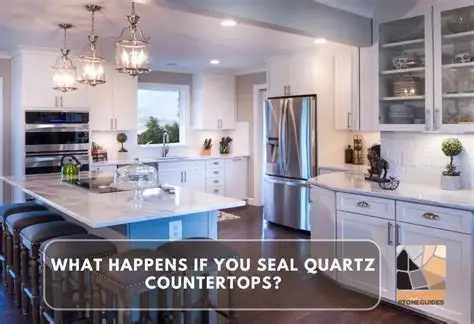When investing in a sleek and stylish surface like quartz countertops, it’s natural to want to preserve their beauty and longevity. One of the most common questions homeowners ask is: Should you seal quartz countertops? This guide will explore the answer in depth while covering everything from composition and care to cost and countertop design options.
Whether you’re choosing quartz kitchen countertops, outfitting a bathroom with Calacatta quartz, or trying to understand how quartz compares to granite, this comprehensive article offers valuable insights into sealing, maintaining, and selecting quartz countertops.

What Are Quartz Countertops?
Quartz countertops are a type of engineered stone countertops made by combining natural quartz crystals with resins, pigments, and other additives. This results in a non-porous, highly durable surface that’s both practical and stylish.
➡️ Learn more: What Are Quartz Countertops?

Should You Seal Quartz Countertops?
The Short Answer: No
Unlike natural stone surfaces such as granite or marble, quartz countertops do not require sealing. Because they are engineered to be non-porous, quartz surfaces naturally resist moisture, bacteria, and stains without the need for a protective sealant.
This characteristic makes quartz an ideal option for busy households, commercial spaces, and those who prefer low maintenance quartz countertops for busy families.
Why Quartz Countertops Don’t Need Sealing
Engineered for Durability
The manufacturing process of quartz slabs combines about 90–95% ground quartz with durable polymer resins. The result is a dense, impermeable surface that doesn’t have microscopic pores like granite or marble. Here’s why sealing is unnecessary:
- No moisture absorption
- No need for regular reapplication of sealant
- Stain and scratch resistance built-in
- Long-lasting shine and color retention
➡️ Want to explore sealing anyway? See: How to Seal Quartz Countertops?
When Might Sealing Be Considered?
Although not required, in rare cases you might consider sealing:
- Older or damaged quartz surfaces that have lost their factory coating.
- DIY installations where fabrication errors expose raw edges.
- Commercial kitchens requiring additional sanitization measures.
➡️ More on this topic: Do You Need to Seal Quartz Countertops?
The Pros and Cons of Quartz Countertops
Advantages
- Low Maintenance: No sealing, polishing, or reconditioning required.
- Design Versatility: Available in styles like white quartz countertops, black quartz countertops, grey quartz countertops, and marble look quartz countertops.
- Durability: Scratch, stain, and chip-resistant.
- Uniform Appearance: Consistent patterning, especially in veined quartz countertops.
- Hygienic: Non-porous surfaces deter bacteria and mildew.
Disadvantages
- Heat Sensitivity: Prolonged heat exposure can damage resin binders.
- Less Natural Variation: Unlike granite, quartz lacks natural, one-of-a-kind veining.
- Higher Price Point: Premium designs like Calacatta quartz countertops can be expensive.
Quartz vs Granite Countertops
| Feature | Quartz | Granite |
|---|---|---|
| Sealing Required? | ❌ No | ✅ Yes, regularly |
| Porosity | Non-porous | Porous |
| Appearance | Uniform patterns | Natural variation |
| Maintenance | Minimal | Moderate |
| Heat Resistance | Moderate | High |
| Cost | Moderate to high | Variable |
Interested in granite care?
➡️ How to Clean White Granite Countertops?
➡️ How to Clean Stained, Dull, or Gritty Granite Countertops?
Ideal Applications for Quartz Countertops
Quartz Kitchen Countertops
Quartz kitchen countertops offer functionality and beauty, perfect for modern home cooks or entertainers. Their resistance to stains from wine, oils, and acidic foods makes them an ideal choice.
- Pair well with stainless appliances
- Great for budget quartz countertops in contemporary kitchens
- Choose affordable white quartz countertops for modern kitchens for a timeless look
Quartz Bathroom Countertops
Quartz bathroom countertops combine aesthetics with hygiene. Water-resistant and mold-proof, they’re a favorite for:
- Vanity tops
- Integrated sinks
- Custom backsplash designs
Explore the best types of quartz countertops for bathroom vanities to elevate your bathroom remodel.
How to Clean Quartz Countertops
Although sealing isn’t needed, regular cleaning helps maintain appearance:
Daily Cleaning
- Use a soft cloth or sponge
- Mild dish soap and warm water
- Wipe spills promptly
Tough Stains
- Use non-abrasive cleaners
- Avoid harsh chemicals or bleach
- Never use rough pads or metal scouring tools
➡️ See full guide: How to Clean Quartz Countertops
Quartz Countertop Installation Cost
Costs can vary depending on region, complexity, and customization. Here’s a quick breakdown:
| Type | Average Cost per sq. ft. |
|---|---|
| Budget quartz countertops | $50–$70 |
| Mid-range designs | $70–$100 |
| Premium styles (Calacatta) | $100–$150+ |
You may pay more for:
- Waterfall edges
- Custom cutouts
- Seamless joins
Find out what’s available in your area:
- Quartz countertops near me
- Quartz countertops in [city/region]
Where to Buy and Who to Trust
Custom Installers & Showrooms
For tailored solutions, seek custom quartz countertop installers who can guide you through measuring, templating, and finishing options.
Visit quartz countertop showrooms to explore colors and textures up close.
Suppliers
Your local quartz countertop suppliers often have competitive pricing and access to top brands. Ask about:
- Remnant quartz slabs for budget projects
- Manufacturer warranties
- Lead times for custom orders
DIY Quartz Countertop Installation Tips
Thinking of doing it yourself? Here are some helpful tips:
- Measure twice, cut once. Mistakes are costly.
- Ensure cabinets are level and stable.
- Use epoxy adhesives made for engineered stone.
- Seal seams with color-matching caulk.
🔧 Want more? Check out: DIY quartz countertop installation tips
Are Quartz Countertops Worth It?
If you’re seeking an elegant, easy-to-maintain surface with long-term durability, then yes, quartz countertops are worth it. While they may be more expensive upfront than laminate or basic granite, their longevity and performance offer excellent value.
Best Quartz Countertops for Kitchens and Bathrooms
- White quartz countertops: Clean, bright, and timeless.
- Black quartz countertops: Modern and dramatic.
- Calacatta quartz countertops: High-end, marble-inspired beauty.
- Grey quartz countertops: Neutral and adaptable to any décor.
Conclusion
Should you seal quartz countertops? The answer is a confident no—thanks to their engineered, non-porous surface, quartz countertops are maintenance-friendly and naturally resistant to staining and moisture.
From budget quartz countertops to luxury marble-look quartz, there’s an option for every design style and budget. Choose quartz for your next renovation, and enjoy the lasting beauty and convenience of one of the best countertop materials on the market.

